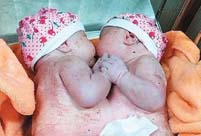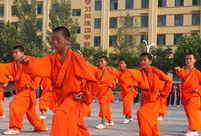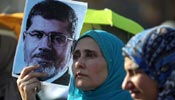 Chinese Air Force's combat group organizes actual-combat training
Chinese Air Force's combat group organizes actual-combat training Street fitness instructor
Street fitness instructor
 Couples from 56 ethnic groups create new Guinness record of proposal
Couples from 56 ethnic groups create new Guinness record of proposal
 Pakistan celebrates Independence Day
Pakistan celebrates Independence Day
 Collective wedding ceremony for 'Beijing drifters’ held in Happy Valley
Collective wedding ceremony for 'Beijing drifters’ held in Happy Valley
 An antique camera collector in Tianjin
An antique camera collector in Tianjin
 Protests held in Gaza, Jordan to support Egyptian people
Protests held in Gaza, Jordan to support Egyptian people
 China Beijing Int'l Gifts, Premium&Houseware Exhibition opens
China Beijing Int'l Gifts, Premium&Houseware Exhibition opens
 Joey Yung's new album cover released
Joey Yung's new album cover released
TOKYO, Aug. 15 -- The visit to the controversial Yasukuni Shrine on Thursday by three Japanese ministers, on the 68th anniversary of Japan's surrender in World War II, has drawn deserved criticism from countries that suffered Japan's war time aggression.
Prime Minister Shinzo Abe opted not to visit the war-linked shrine, but sent a proxy so he could still pay homage at the shrine, which honors 2.5 million soldiers killed in past wars, including 14 Class-A convicted war criminals from WWII.
The move by Abe was an attempt to appease both his right-wing, nationalist supporters and neighboring countries like South Korea and China who were both brutalized by Japan during the war.
But Abe's scheme was vacuous, as Abe said he regretted not personally visiting the shrine and failed to admit whether he would do so in the near future.
Coupled with this, by Abe not mentioning and apologizing for Japan's past war-time aggression during his "peace pledge" made earlier Thursday, in contrast to previous speeches made by Japan's past leaders, it comes as no surprise that China lodged a formal protest about the Japanese Cabinet members' visit to Yasukuni, to Japan's ambassador to China, Masato Kitera.
South Korea, for its part, said that Japan needs to "resolve the issues" following its occupation of the Korean Peninsular from 1910-1945. At a ceremony in Seoul to mark the anniversary of the end of Japan's occupation, President Park Geun Hye urged Japanese politicians to be more proactive about rectifying Japan's well- documented atrocities during the war.
In addition to visits to Yasukuni by Japan's Internal Affairs and Communications Minister Yoshitaka Shindo, Keiji Furuya, chairman of the National Public Safety Commission, and administrative reform minister Tomomi Inada, more than 100 Japanese lawmakers also paid visits at the shrine.
Abe said previously that the visit to the notorious shrine on the 68th anniversary of Japan's surrender in WWII was a matter of "personal choice" and the nation's premiere did not advise or impose an embargo on his ministers or other lawmakers from visiting.
Some Cabinet members and lawmakers here argued that Yasukuni is no different in nature to the United States' war cemetery -- the Arlington National Cemetery, in Arlington County, Virginia -- or the war-linked cemeteries in the United Kingdom that fall under the jurisdiction of the Commonwealth War Graves Commission.
The stark reality, however, is that these arguments are both fallacious and ill-founded.
Unbeknown to many, the Yasukuni Shrine served as the "command headquarters" of State Shinto, a religion that saw Japan's emperor as a "living god" and enlisted Japanese civilians to fight a "holy war" on behalf of their "god."
The shrine is run by a private foundation and the 14 Class-A war criminals' "souls" were enshrined there secretly in 1978, by the clandestine foundation.
The foundation, which also runs Yasukuni's museum, nowadays openly depicts the war criminals as martyrs and misrepresents Japan's war in China as an act of "suppression" rather than one of aggression.
The museum has numerous displays depicting Japan's war-time endeavors, but has blatantly misrepresented the actual facts, in not referring to the well-documented Nanjing massacre (also known as the Rape of Nanjing), experiments conducted on prisoners of war and the suffering of thousands of comfort women at the hands of the Japanese Imperial Army.
Hence, politicians who visit the shrine insisting they are paying tribute to the lives lost in WWII, are, wittingly or otherwise, lying.
Former Emperor Hirohito stopped visiting the shrine in 1978 because of the enshrinement of war criminals there and Japan's current emperor Akihito has continued the imperial family's moratorium on visits to the shrine -- a loosely veiled site of overt nationalistic propaganda, that glorifies Japan's militaristic past.
The controversy over the shrine can only be resolved if all Japanese ministers boycott visits to the shrine. Only then can Japan have any chance of garnering the trust and respect of its neighboring countries.
But the move has to come from the top, and the onus of responsibility rests squarely with Abe.
Previous calls have been made by officials to de-enshrine the war criminals, but the Shinto organization says this is impossible.
The best solution, according to a number of experts on the matter, is for Japan's politicians to pay their respect to the lives lost during the war at Japan's official war cemetery, just minutes from the unofficial Yasukuni site.
The Chidorigafuchi National Cemetery was established by the Japanese government in 1959 to house the remains of Japanese soldiers who died during World War II.
Some of the remains enshrined here were recovered in a series of government missions starting in 1953 and others were brought home after the war by returning military units and individuals. They include not only servicemen and military support personnel but ordinary civilians as well, according to the environment ministry.
If Japan is truly looking to restore peace and to better relations with its neighbors in the Asia Pacific region, then a good starting point would be a governmental boycott of all visit to Yasukuni, personal or otherwise, in favor of Japan's official Chidorigafuchi war cemetery, which is the same in nature as the uncontroversial cemeteries in the U.S. and UK and devoid of historical fiction and calculated propaganda.
 Helicopters, tanks seen during China-Russia joint drill
Helicopters, tanks seen during China-Russia joint drill Conjoined twins separated in groundbreaking surgery
Conjoined twins separated in groundbreaking surgery Summer photos of Zhang Xinyi, how graceful
Summer photos of Zhang Xinyi, how graceful  Pakistan celebrates Independence Day
Pakistan celebrates Independence Day Beijing Int'l Gifts, Premium & Houseware Exhibition opens
Beijing Int'l Gifts, Premium & Houseware Exhibition opens Kung Fu soccer team trains at Songshan Shaolin training base
Kung Fu soccer team trains at Songshan Shaolin training base  Air Force's combat group conducts flight training in joint drills
Air Force's combat group conducts flight training in joint drills Protests held in Gaza, Jordan to support Egyptian people
Protests held in Gaza, Jordan to support Egyptian people Various sun protective outfits
Various sun protective outfits Jaguar Land Rover to recall 11,852 cars
Jaguar Land Rover to recall 11,852 cars In sports arena, you are my greatest rival!
In sports arena, you are my greatest rival! Top 10 fatal vipers on earth
Top 10 fatal vipers on earth Day|Week|Month